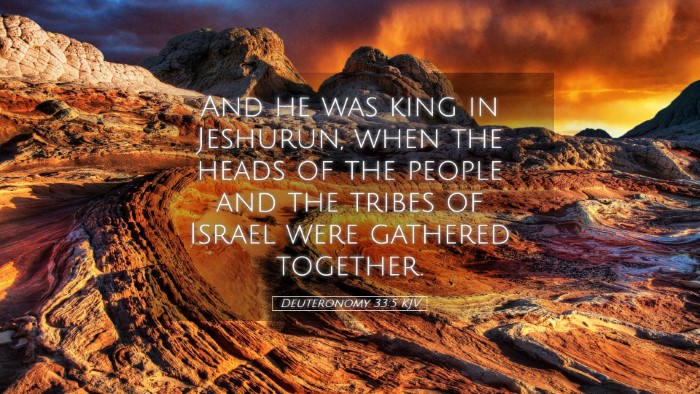Commentary on Deuteronomy 33:5
Verse Text: "And he was king in Jeshurun, when the heads of the people and the tribes of Israel were gathered together." (Deuteronomy 33:5)
Introduction
The passage of Deuteronomy 33:5 is situated within Moses’ blessing to the twelve tribes of Israel before his death. This verse highlights the leadership of the Lord over His people and emphasizes the communal aspect of Israel's governance. The significance of this verse can be unpacked through various theological and practical lenses as interpreted by renowned commentators.
Contextual Overview
This chapter serves as a farewell address from Moses, encapsulating not just blessings but also the historical journey of Israel. Understanding the context—namely, the Israelites’ experiences in the wilderness and the cusp of entering the Promised Land—is crucial to grasp the full weight of verse 5.
Theological Insights
- Moses as a Prophet: Matthew Henry notes that Moses speaks as a prophet here, establishing God’s sovereignty over Israel and recognizing that true kingship belongs to the Lord. God is seen not just as a ruler, but as the one who has delivered and guided His people.
- Jeshurun's Significance: Albert Barnes remarks that "Jeshurun" is a term of endearment for Israel, translating to 'the upright one.' This implies mutual expectations between God and Israel, emphasizing righteousness as a hallmark of their communal identity.
- Divine Leadership: Adam Clarke points out that leadership in Israel is portrayed as a collective endeavor, with Moses hinting at theocratic governance. God’s kingship complements the leadership of Israel’s tribal heads, underlining their responsibility to uphold divine mandates.
Commentary from Matthew Henry
In his comprehensive work, Matthew Henry illustrates that this verse serves as a reminder of God's eternal kingship. He emphasizes the unity that comes from gathering under God's rule, suggesting that all leaders and people find their ultimate purpose in submitting to divine authority. The gathering of the tribes signifies not just order but also the acknowledgment of God's supremacy over their nation.
Commentary from Albert Barnes
Albert Barnes expounds on the significance of the collective gathering of the tribes. He associates this moment with the prophetic unification of God's chosen people, destined for a divine purpose. Barnes sharply notes that the acknowledgment of God as a king among His people is foundational for understanding Israel's identity and mission. He posits that this kingship not only leads but also nurtures the community's covenantal relationship with God.
Commentary from Adam Clarke
In Clarke's theological examination, he underscores the fact that Moses’ statement about God as king also serves as a prelude to the future establishment of human kings in Israel. Clarke discusses the implications surrounding governance, suggesting there is a divine blueprint behind Israel's political structure, foreshadowing concepts of leadership that align with God’s kingdom principles. This reminds believers of God's ultimate authority in all matters of life and governance.
Practical Applications
- Understanding God’s Kingship: By recognizing God as the king of their lives, individuals can cultivate a deeper sense of purpose and alignment with His will.
- Importance of Unity: The act of gathering signifies the importance of unity among believers today, reflecting the need for communal worship and collective recognition of God’s sovereignty.
- Leadership Responsibilities: For church leaders and pastors, this verse reminds them of their role under God’s authority, necessitating a commitment to represent His justice and mercy in their guidance of the community.
Conclusion
Deuteronomy 33:5 provides profound insights into the nature of God's relationship with His people, the reminders of His kingship, and the collective responsibility of Israel's leaders and tribes. As elucidated by Matthew Henry, Albert Barnes, and Adam Clarke, understanding this verse offers a great wealth of knowledge for pastors, students, theologians, and scholars alike. It beckons every believer to reflect on God’s sovereign leadership in their lives and the communal dynamics of faith that shape the body of Christ.


